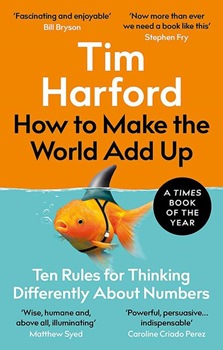Description
Factfulness meets How to Be Right in this major new book from globally bestselling economist Tim Harford 'Tim Harford is our most likeable champion of reason and rigour... clear, clever and always highly readable' Times Books of the Year 'If you aren't in love with stats before reading this book, you will be by the time you're done. Powerful, persuasive, and in these truth-defying times, indispensable' Caroline Criado Perez, author of Invisible Women 'Nobody makes the statistics of everyday life more fascinating and enjoyable than Tim Harford' Bill Bryson 'Fabulously readable, lucid, witty and authoritative . . . Every politician and journalist should be made to read this book, but everyone else will get so much pleasure and draw so much strength from the joyful way it dispels the clouds of deceit and delusion' Stephen Fry 'Wise, humane and, above all, illuminating. Nobody is better on statistics and numbers - and how to make sense of them' Matthew Syed THE SUNDAY TIMES BUSINESS BESTSELLER When was the last time you read a grand statement, accompanied by a large number, and wondered whether it could really be true? Statistics are vital in helping us tell stories - we see them in the papers, on social media, and we hear them used in everyday conversation - and yet we doubt them more than ever. But numbers - in the right hands - have the power to change the world for the better. Contrary to popular belief, good statistics are not a trick, although they are a kind of magic. Good statistics are not smoke and mirrors; in fact, they help us see more clearly. Good statistics are like a telescope for an astronomer, a microscope for a bacteriologist, or an X-ray for a radiologist. If we are willing to let them, good statistics help us see things about the world around us and about ourselves - both large and small - that we would not be able to see in any other way. In How to Make the World Add Up, Tim Harford draws on his experience as both an economist and presenter of the BBC's radio show 'More or Less'. He takes us deep into the world of disinformation and obfuscation, bad research and misplaced motivation to find those priceless jewels of data and analysis that make communicating with numbers worthwhile. Harford's characters range from the art forger who conned the Nazis to the stripper who fell in love with the most powerful congressman in Washington, to famous data detectives such as John Maynard Keynes, Daniel Kahneman and Florence Nightingale. He reveals how we can evaluate the claims that surround us with confidence, curiosity and a healthy level of scepticism. Using ten simple rules for understanding numbers - plus one golden rule - this extraordinarily insightful book shows how if we keep our wits about us, thinking carefully about the way numbers are sourced and presented, we can look around us and see with crystal clarity how the world adds up.
About the Author
Tim Harford is a senior columnist for the Financial Times and the presenter of Radio 4 s More or Less. He was the winner of the Bastiat Prize for economic journalism in 2006, and More or Less was commended for excellence in journalism by the Royal Statistical Society in 2010, 2011 and 2012. Harford lives in Oxford with his wife and three children, and is a visiting fellow at Nuffield College, Oxford. His other books include The Undercover Economist, The Logic of Life and Adapt.
